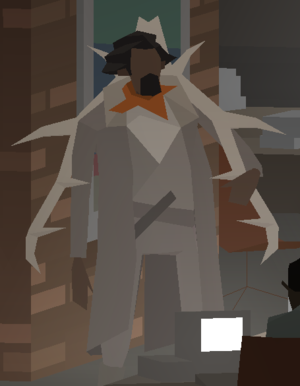Even for a low-activity wiki, hosting & rendering many HQ image files takes significant resources and comes with high monthly server costs.
If you're able, please consider contributing to keep the site running to help support this independent, ad-free, fan-run site. Thank you!
Difference between revisions of "James B. Carrington"
m |
m |
||
| Line 12: | Line 12: | ||
Little is known about Carrington's life. | Little is known about Carrington's life. | ||
| − | Throughout the story, Carrington searches for an outdoor venue to perform his play, an experimental adaptation of "[[wikipedia:The Death of the Hired Man|The Death of the Hired Man]]" by [[wikipedia:Robert Frost|Robert Frost]], | + | Throughout the story, Carrington searches for an outdoor venue to perform his [[Death Of The Hired Man|play]], an experimental adaptation of "[[wikipedia:The Death of the Hired Man|The Death of the Hired Man]]" by [[wikipedia:Robert Frost|Robert Frost]]. At [[Equus Oils]] in [[Act I]], he asks [[Conway]] to find a venue for him: "Somewhere outdoors. Somewhere intimate. Somewhere tragic." |
| − | In the beginning of [[Act II]], Carrington talks with [[Lula]] at the [[Bureau of Reclaimed Spaces|Bureau]] and quotes the French dramatist [[wikipedia:Antonin Artaud|Antonin Artaud]]. He appears later at the [[Random Access Self Storage|self storage facility]], asking Conway for ideas as to a venue. | + | In the beginning of [[Act II]], Carrington talks with [[Lula]] at the [[Bureau of Reclaimed Spaces|Bureau]] and quotes the French dramatist [[wikipedia:Antonin Artaud|Antonin Artaud]]. He appears later at the [[Random Access Self Storage|self-storage facility]], asking Conway for ideas as to a venue. |
In Act III, he will meet the group at the location suggested for the play in the previous act – either at Equus Oils, [[Elkhorn Mine]], the storage facility. In talking with [[Shannon]], he references plays, such as ''[[wikipedia:Oresteia|Oresteia]]'', ''[[wikipedia:Goethe's Faust|Faust]]'', ''[[wikipedia:The Iceman Cometh|The Iceman Cometh]]'', and ''[[wikipedia:The Glass Menagerie|The Glass Menagerie]]''. | In Act III, he will meet the group at the location suggested for the play in the previous act – either at Equus Oils, [[Elkhorn Mine]], the storage facility. In talking with [[Shannon]], he references plays, such as ''[[wikipedia:Oresteia|Oresteia]]'', ''[[wikipedia:Goethe's Faust|Faust]]'', ''[[wikipedia:The Iceman Cometh|The Iceman Cometh]]'', and ''[[wikipedia:The Glass Menagerie|The Glass Menagerie]]''. | ||
| Line 30: | Line 30: | ||
[[Category:Act IV]] | [[Category:Act IV]] | ||
[[Category:The Entertainment]] | [[Category:The Entertainment]] | ||
| − | [[Category:Death | + | [[Category:Death Of The Hired Man]] |
Revision as of 14:24, 1 February 2020
James Beckwourth Carrington, usually referred to as just Carrington, is a friend of Joseph and Lula from their college days. He is the director of the plays The Entertainment and Death Of The Hired Man. Conway has the chance to meet him at Equus Oils in Act I.
A wrongle of Carrington is viewable at http://kentuckyroutezero.com/phonebooth.wrongle.
Personality
Carrington is an enthusiastic and verbose character with an impressive knowledge of and passion for dramatic works.
Life
Little is known about Carrington's life.
Throughout the story, Carrington searches for an outdoor venue to perform his play, an experimental adaptation of "The Death of the Hired Man" by Robert Frost. At Equus Oils in Act I, he asks Conway to find a venue for him: "Somewhere outdoors. Somewhere intimate. Somewhere tragic."
In the beginning of Act II, Carrington talks with Lula at the Bureau and quotes the French dramatist Antonin Artaud. He appears later at the self-storage facility, asking Conway for ideas as to a venue.
In Act III, he will meet the group at the location suggested for the play in the previous act – either at Equus Oils, Elkhorn Mine, the storage facility. In talking with Shannon, he references plays, such as Oresteia, Faust, The Iceman Cometh, and The Glass Menagerie.
He claims drama is only his second love; his true calling is pseudoscience.
Inspiration
The character of Carrington was inspired by two historical figures: James Pierson Beckwourth, an African American mountain man from the mid-19th century, and Whately Carington, an English parapsychologist.
